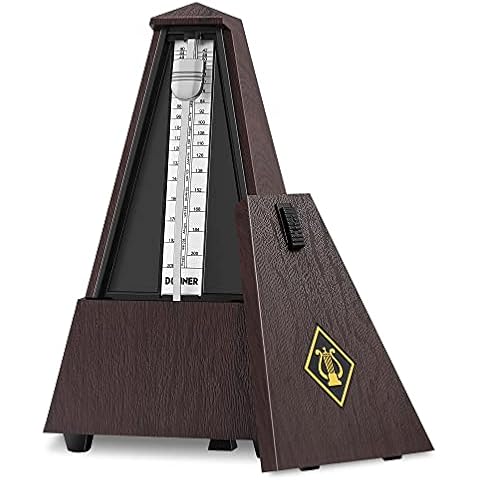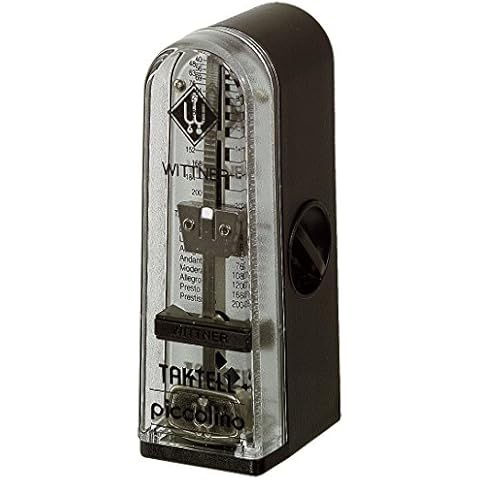Best Plastic Metronomes of 2026
* We independently evaluate all recommended products and services. If you click on links we provide, we may receive compensation.
Plastic metronomes are essential tools for musicians of all levels who want to improve their timing and rhythm. These small devices produce a steady beat that can be adjusted to various tempos, making them perfect for practise sessions or performances. They are also portable and lightweight, making them easy to carry around in a music bag or backpack. With a range of features such as adjustable volume and time signature, plastic metronomes are a reliable and affordable option for musicians looking to stabilise their timing and improve their playing.
At a Glance: Our Top Picks
Top 10 Plastic Metronomes
Wittner Taktell Piccolo 830 Metronome
The Wittner Piccolo 830 is a reliable mechanical metronome crafted from high-quality plastic, ensuring durability and stability for your musical practices. Its wind-up mechanism means you won't need batteries, making it both practical and environmentally friendly. Proudly made in Germany, you can trust in its quality and precision. With its sleek black design and no bell, this metronome is ideal for musicians of all levels, helping you perfect your timing and maintain a consistent tempo while playing.
Wittner Taktell Pyramid Metronome 845
The Wittner Taktell 845 is designed with a sturdy plastic casing, ensuring durability and stability for long-term use. As a mechanical wind-up metronome, it eliminates the need for batteries, offering convenience and resource savings. Manufactured in Germany, you can rely on its quality and precision in every performance. The elegant walnut grain finish adds a touch of style, making it an ideal tool for musicians looking to perfect their timing.
Donner DPM-1 Mechanical Metronome for Musicians
The Donner DPM-1 Metronome is designed for musicians seeking to enhance their practice sessions. Its easy-to-use pendulum swing lets you select your desired beat and tempo, ensuring you stay on track. The classic pyramid design not only looks appealing but also resonates well with musicians. With a range of 40 to 208 beats per minute and various beat selections, you can tailor your practice to suit your instrument. Plus, the wind-up spring mechanism eliminates the need for batteries, making it a cost-effective choice.
Wittner Taktell Super-Mini Mechanical Metronome
The Wittner Taktell Metronome is a reliable tool for musicians looking to perfect their timing. Its sturdy plastic casing ensures durability, making it a long-lasting companion for your practice sessions. You will appreciate the mechanical wind-up feature, which eliminates the need for batteries, saving you resources and offering practicality. Made in Germany, this metronome guarantees quality and precision, ensuring you can trust it for consistent performance while playing your instrument.
Wittner Maelzel Series 855 Metronome
The Wittner 855 Metronome features a sturdy plastic casing, ensuring it remains durable and stable during use. You will appreciate the convenience of its mechanical wind-up design, as it requires no batteries, saving you resources while allowing for easy operation. Manufactured in Germany, this metronome offers the quality and precision that musicians can trust. With its elegant mahogany grain finish and built-in bell, you can enjoy not only functionality but also style in your practice sessions.
Wittner Taktell Piccolino Metronome - Black
The Wittner Piccolino Metronome features a sturdy plastic casing that ensures durability and stability, making it a reliable choice for musicians. Its mechanical wind-up design removes the need for batteries, allowing you to save resources while enjoying practicality. Manufactured in Germany, this metronome offers the quality and precision that you can trust. The sleek black design, without a bell, makes it an ideal tool for perfecting your timing, whether you are a beginner or a professional musician.
Wittner Taktell Tomcat Mechanical Metronome
The Wittner Tomcat Metronome is designed with a sturdy plastic casing, ensuring durability and stability for long-lasting use. Its mechanical wind-up function means you won't need batteries, making it an eco-friendly choice that saves resources. Proudly made in Germany, this metronome offers quality and precision you can trust. Available in a sleek black and grey design, it serves as an ideal tool for musicians of all levels, helping you perfect your timing and maintain a precise tempo while playing.
Wittner Taktell QM 2 Metronome with Pitch
The Wittner QM 2 Metronome is designed to provide precise tempo control, allowing you to select from 39 different positions between 40 and 208 beats per minute. This flexibility is invaluable for musicians who need to practice at specific speeds. Additionally, it features both auditory and visual indicators, catering to your personal preferences for learning and playing. Its compact and durable plastic casing makes it a reliable companion for any musician, ensuring it withstands regular use. Furthermore, the built-in pitch function helps you tune your instruments accurately.
Wittner Metronome Taktell Pyramid Shape System
The Wittner Taktell Metronome is crafted with a sturdy plastic casing, ensuring durability and stability for long-term use. This mechanical wind-up device requires no batteries, making it a practical choice that saves resources. Manufactured in Germany, you can trust its quality and precision. Its root wood colour and integrated bell not only add an attractive touch but also provide audible signals to help you maintain the perfect tempo while playing.
Wittner Taktell Piccolo Metronome - Silver
The Wittner Piccolo Metronome boasts a sturdy plastic casing, ensuring durability for long-term use. Its mechanical wind-up design means you won't need batteries, making it both efficient and environmentally friendly. Manufactured in Germany, you can trust the quality and precision of this metronome. Its sleek silver colour adds a touch of elegance, making it a stylish accessory for any musician. With this metronome, you can perfect your timing and maintain a precise tempo while playing.
Frequently Asked Questions (FAQs)
1. What are the two types of metronomes?
Today, there are many different kinds of metronomes available, but they can generally be broken down into two main categories: digital and analog. This week we're going to take a look at a few of the different kinds of metronomes out there, as well as the pros and cons of the two big types. But first…
2. What are metronomes made of?
Usually made of plastic, these timekeepers have an adjustable beats-per-minute (BPM) dial. Some offer a light that flashes along with the beat so that users have a visual as well as an auditory tempo cue. Digital metronomes are a step up from quartz metronomes.
3. What can metronomes keep?
A metronome can help you keep a consistent tempo so that you don't inadvertently speed up or slow down. It provides a steady click marking a musical interval. What that interval is will be up to the player, but options include: Quarter notes.
4. Are all metronomes the same?
Metronomes come in all different styles and sizes (more on that below) but all have the same, utilitarian purpose; they create some type of sound - typically a click or a tick, but there are also voice options available.
During our plastic metronome research, we found 61 plastic metronome products and shortlisted 10 quality products. We collected and analyzed 20,097 customer reviews through our big data system to write the plastic metronomes list. We found that most customers choose plastic metronomes with an average price of £28.57.
The plastic metronomes are available for purchase. We have researched hundreds of brands and picked the top brands of plastic metronomes, including Wittner, Donner.
Hayden was born in Liverpool, and he never left his hometown until university. In his freshman year at the University of Manchester, Hayden was the group leader of a popular music group. Hayden is responsible for the popularity of his music, and this is because of his natural ability to play with keys and strings. He graduated with BFA in 2016 and returned in 2018 as a lecturing staff in the School of Music.









